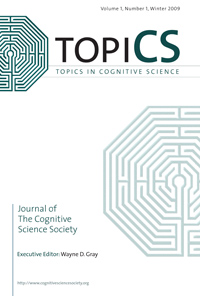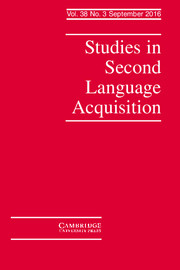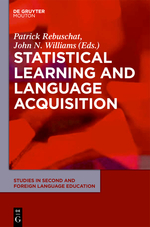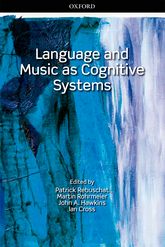Under review (preprints available)
Zhang, W., Rebuschat, P., & Monaghan, P. (under review). Individual differences in children’s response to explicit instruction: Effects of age and memory ability.
Bennett, S. C., Flores, C., Rebuschat, P., & Monaghan, P. (under review). Effects of language experience on proficiency in the heritage and majority languages: A meta-analysis.
Oksuz, D. C., Akef, S., Mendes, A., & Rebuschat, P. (under review). Noun-adjective collocations in L2 Portuguese: Exploring the effects of proficiency and native language in a large-scale learner corpus.
Bennett, S., Correia, S., Monaghan, P. & Rebuschat, P. (under review). The effects of production and native phonology on cross-situational word learning.
Li, J., Ruiz, S., Ge, Y., & Rebuschat, P. (under review). Aligning instruction with learner profiles: A methodological synthesis of Aptitude–Treatment Interaction research in SLA.
Fernández Santos, A., Rebuschat, P., Correia, S., Monaghan, P., & Llompart, M. (under review). The effect of morphological salience and novel phonology in the initial stage of second language learning
Lee, Y.-W., Rebuschat, P., & Casaponsa, A. (under review). Inhibit the current and prepare for the next: Language pre-activation and contextual modulation in bilingual speech production
Zhu, L., Monaghan, P., & Rebuschat, P. (under review). How salience shapes the statistical learning of non-native morphology.
Zhang, W., Rebuschat, P., & Monaghan, P. (under review). The role of age and instruction in statistical learning of vocabulary and grammar.
Wang, X., Ge, Y., Monaghan, P., & Rebuschat, P. (under review). The role of musical aptitude in L2 Chinese word learning: Evidence from cross-situational statistical learning.
Ge, Y. & Rebuschat, P. (under review). Statistical learning of Chinese characters: The role of phonological similarity and explicit instruction.
Ci, Y., Ge, Y., Zheng, Q., Kachlicka, M., Saito, K., Rebuschat, P., & Correia, S. (under review). Individual differences in the sub-lexical perception and production L2 Mandarin.
Correia, S., Ge, Y., Tavares, G., & Rebuschat, P. (under review). Online experimentation in L2 speech research: A critical reflection and guidelines for future research.
Walker, N., Rebuschat, P., & Monaghan, P. (under review). The optimal lag for intentional and incidental language learning.
Öksüz, D., Akef, S., Mendes, A., & Rebuschat, P. (under review). Collocations in L2 Portuguese: Investigating the effects of proficiency and native language in a learner corpus.
Ge, Y., Rebuschat, P., Kachlicka, M., Saito, K., & Monaghan, P. (under review). Auditory processing ability predicts statistical word learning.
In press
Tavares, G., Ge, Y., Correia, S., & Rebuschat, P. (2025). From meaning to sound: How word learning shapes non-native speech perception. Frontiers in Psychology, 16, 1620837. https://doi.org/10.3389/fpsyg.2025.1620837 ![]()
Ge, Y., Correia, S., Hanson, K., Fernandes, J. D., Rato, A. , & Rebuschat, P. (in press). Does phonetic training benefit word learning? Studies in Second Language Acquistion. ![]()
Lee Y-W, Rebuschat P, Casaponsa A. Top-down and bottom-up bilingual speech production: The effects of language context on inhibitory control. Bilingualism: Language and Cognition. Published online 2025:1-13. doi:10.1017/S1366728925100357 ![]()
Zhu, L., Rebuschat, P., Nixon, J. S., & Monaghan, P. (2025). Learning morphology from cross-situational statistics. Studies in Second Language Acquisition, 1–27. doi:10.1017/S027226312510106X ![]()
Zhang W, Monaghan P, Bennett S, Rebuschat P. Children’s simultaneous or successive acquisition of vocabulary and grammar: Evidence from cross-situational learning. Journal of Child Language. Published online 2025:1-15. doi:10.1017/S0305000925100135 ![]()
Correia, S., Rato, A., Ge, Y., Fernandes, J. D., Kachlicka, M., Saito, K. & Rebuschat, P. (in press). Effects of phonetic training and cognitive aptitude on the perception and production of non-native speech contrasts. Studies in Second Language Acquisition. ![]()
Published
Ruiz, S., Monaghan, P., Zhang, W., Li, J., Jiang, C., Yang, S., & Rebuschat, P. (2025). The interface between memory and instruction in language learning: An aptitude–treatment interaction study. Journal of Memory and Language, 144, 104660. ![]()
Akef, S., Meurers, D., Mendes, A., & Rebuschat, P. (2025). Interpretable machine learning for societal language identification: Modeling English and German influences on Portuguese heritage language. In Proceedings of the 14th Workshop on Natural Language Processing for Computer Assisted Language Learning (pp. 50–62). University of Tartu Library, Tallinn, Estonia. ![]()
Rothman, J., Bayram, F., Hao, J., & Rebuschat, P. (2025). On “local theory” neutrality with respect to “meta-theories” and data from a diversity of “native speakers”, including Heritage Speaker bilinguals. Languages, 10(5), 98. ![]()
Ge, Y., Correia, S., Lee, Y.-W., Jin, Z., Rothman, J., & Rebuschat, P. (2025). Statistical learning of foreign language words in younger and older adults. Bilingualism: Language and Cognition, 28(3), 716–727. ![]()
Ge, Y., Monaghan, P., & Rebuschat, P. (2025). The role of phonology in non-native word learning: Evidence from cross-situational statistical learning. Bilingualism: Language and Cognition, 28(1), 15–30. Open access, please click the link to read. ![]()
Öksüz, D., Brezina, V., Monaghan, P., & Rebuschat, P. (2024). Individual word and phrase frequency effects in collocational processing: Evidence from typologically different languages, English and Turkish. Journal of Experimental Psychology: Learning, Memory, and Cognition, 50(8), 1287–1314. Open access, please click the link to read. ![]()
Ruiz, S., & Rebuschat, P. (2024). A systematic methodological review of offline Input Processing (pp. 345-363). In W. Wong & J. Barcroft (Eds.), The Routledge Handbook of Second Language Acquisition and Input Processing. Routledge. For supplementary materials, please see here.
Schiefer, J., Philipp, J., Moscoso, J. A., Catarino, A. I., Afonso, P., Golle, J., & Rebuschat, P. (2024). Science and Heritage Language Integrated Learning (SHLIL): Evidence for the effectiveness of an innovative science outreach program for migrant students. Science Education, 108(4), 983-1014. ![]()
Ge, Y., Rato, A., Rebuschat, P., & Monaghan, P. (2024). Constraints on novel word learning in heritage speakers. Frontiers in Psychology. ![]()
Akef, S., Meurers, D., Mendes, A., & Rebuschat, P. (2024). Investigating the generalizability of Portuguese readability assessment models trained using linguistic complexity features. Proceedings of the 16th International Conference on Computational Processing of Portuguese (pp. 332–341), Santiago de Compostela, Galicia/Spain. Association for Computational Lingustics. ![]()
Ruiz, S., Rebuschat, P., & Meurers, D. (2023). Individualization of practice through intelligent CALL. In Y. Suzuki (Ed.), Practice and Automatization in Second Language Research: Perspectives from skill acquisition theory and cognitive psychology. Routledge.
Williams, J. N. & Rebuschat, P. (2023). Implicit learning and SLA: A cognitive psychology perspective. In A. Godfroid and H. Hopp (Eds), The Routledge Handbook of Second Language Acquisition and Psycholinguistics (pp. 281-293). Routledge.
Brandt, S. & Rebuschat, P. (2022). Language acquisition. In Culpeper, J., Atanasova, D., Nance, C., van Olmen, D., Kirkham, S., & Casaponsa, A. (Eds). Introducing linguistics. Routledge.
Rebuschat, P. & Casaponsa, A. (2022). Experimental methods. In Culpeper, J., Atanasova, D., Nance, C., van Olmen, D., Kirkham, S., & Casaponsa, A. (Eds). Introducing linguistics. Routledge.
Chen, X., Meurers, D., & Rebuschat, P. (2022). ICALL offering individually-adaptive input: The effect of complex input on L2 development. Language Learning and Technology, 26(1), 1–21.
Rebuschat, P. (2022). Implicit learning and language acquisition: Three approaches, one phenomenon. In A. S. Reber & R. Allen (Eds.) The cognitive unconscious: The first half-century. Oxford University Press.
Ruiz, S., Rebuschat, P., & Meurers, D. (2021). The effects of working memory and declarative memory on instructed second language vocabulary: Insights from intelligent CALL. Language Teaching Research, 25(4), 510-539. Open access, please click the link to read. ![]()
Zhao, C., Kormos, J., Rebuschat, P., & Suzuki, S. (2021). The effect of modality on implicit-statistical language learning: A contribution to the debate on learning without awareness. Applied Psycholinguistics, 42(3), 703-737. Open access, please click the link to read. ![]()
Monaghan, P., Ruiz, S., & Rebuschat, P. (2021). The role of exposure condition on the cross-situational learning of vocabulary and morphosyntax: Linear mixed effects reveal local and global effects of acquisition. Second Language Research, 37(2) 261–289. Open access, please click the link to read. ![]()
Rebuschat, P., Monaghan, P., & Schoetensack, C. (2021). Learning vocabulary and grammar from cross-situational statistics. Cognition, 206. Open access, please click the link to read. ![]()
Öksüz, D., Brezina, V., & Rebuschat, P. (2021). Collocational processing in L1 and L2: The effects of word frequency, collocational frequency, and transitional probabilities. Language Learning, 71(1), 55-98. Open access, please click the link to read. ![]()
Thierry, G. & Rebuschat, P. (2020). An introduction to the Cognitive Neuroscience of Second and Artificial Language Learning. Language Learning, 70(S2), 5-19. Open access, please click the link to read.
![]()
Thierry, G. & Rebuschat, P. (Eds) (2020). Cognitive neuroscience of second and artificial language learning. Special issue of Language Learning, 70(S2).
Walker, N., Monaghan, P., Schoetensack, C., & Rebuschat, P. (2020). Distinctions in the acquisition of vocabulary and grammar: An individual differences approach. Language Learning, 70(S2), 221-254. Open access, please click the link to read. ![]()
Ruiz, S., Chen, X., Rebuschat, P., & Meurers, D. (2019). Measuring individual differences in cognitive abilities in the lab and on the web. PLoS ONE 14(12): e0226217. Open access, please click the link to read. ![]()
Monaghan, P., Schoetensack, C., & Rebuschat, P. (2019). A single paradigm for implicit and statistical learning. Topics in Cognitive Science, 11(3), 536-554. Open access, please click the link to read. ![]()
 Monaghan, P. & Rebuschat, P. (Eds) (2019). Aligning implicit learning and statistical learning: Two approaches, one phenomenon. Special issue of Topics in Cognitive Science, 11(3).
Monaghan, P. & Rebuschat, P. (Eds) (2019). Aligning implicit learning and statistical learning: Two approaches, one phenomenon. Special issue of Topics in Cognitive Science, 11(3).
Rebuschat, P. & Monaghan, P. (2019). Editors’ introduction: Aligning implicit learning and statistical learning: Two approaches, one phenomenon. Topics in Cognitive Science, 11(3), 459-467. Open access, please click the link to read. ![]()
Ruiz, S., Tagarelli, K., & Rebuschat, P. (2018). Simultaneous acquisition of words and syntax: Effects of instruction and declarative memory. Frontiers in Psychology, 9:1168. Open access, please click the link to read. ![]()
Walker, N., Schoetensack, C., Monaghan, P., & Rebuschat, P. (2017). Simultaneous acquisition of vocabulary and grammar in an artificial language learning task. In G. Gunzelmann, A. Howes, T. Tenbrink, & E. J. Davelaar (Eds.), Proceedings of the 39th Annual Conference of the Cognitive Science Society (pp. 1307-1312). Austin, TX: Cognitive Science Society.
Rebuschat, P., Meurers, D., & McEnery, T. (Eds.) (2017). Language learning research at the intersection of experimental, computational, and corpus-based approaches. Special issue of Language Learning, 67(S1). [Click link to access table of contents]
 Rebuschat, P., Meurers, D., & McEnery, T. (2017). Language learning research at the intersection of experimental, computational, and corpus-based approaches: An introduction. Language Learning, 67(S1), 6-13. Open access, please click the link to read.
Rebuschat, P., Meurers, D., & McEnery, T. (2017). Language learning research at the intersection of experimental, computational, and corpus-based approaches: An introduction. Language Learning, 67(S1), 6-13. Open access, please click the link to read. ![]()
Ziegler, N., Meurers, D., & Rebuschat, P., Moreno Vega, J. L., Li, W., Ruiz, S., Chinkina, M., Grey, S., (2017). Interdisciplinary research at the intersection of CALL, NLP, and SLA: Methdologoical implications from an input enhancement project. Language Learning, 67(S1), 209-231.
Rogers, J., Revesz, A., & Rebuschat, P. (2016). Implicit and explicit knowlege of inflectional morphology. Applied Psycholinguistics, 37, 781–812
Tagarelli, K. M., Ruiz, S., Moreno Vega, J. L., & Rebuschat, P. (2016). Variability in second language learning: The roles of individual differences, learning conditions, and linguistic complexity. Studies in Second Language Acquisition, 38(2), 293-316.
Andringa, S. and Rebuschat, P. (Eds.) (2015). New directions in the study of implicit and explicit learning. Special issue of Studies in Second Language Acquisition, 37(2).
 Rebuschat, P. (Ed.) (2015). Implicit and explicit learning of languages. Amsterdam: John Benjamins.
Rebuschat, P. (Ed.) (2015). Implicit and explicit learning of languages. Amsterdam: John Benjamins.
Andringa, S. and Rebuschat, P.(2015). New directions in the study of implicit and explicit learning: An introduction. Studies in Second Language Acquisition, 37(2), 185-196.
Rogers, J., Revesz, A., & Rebuschat, P. (2015). Challenges in implicit learning research: Validating a novel artificial language. In P. Rebuschat (Ed.), Implicit and explicit learning of languages (pp. 275-299). Amsterdam: John Benjamins.
Rebuschat, P. (2015). Introduction: Implicit and explicit learning of languages. In P. Rebuschat (Ed.), Implicit and explicit learning of languages (pp. xiii-xxii). Amsterdam: John Benjamins.
Tagarelli, K. M., Borges Mota, M. & Rebuschat, P. (2015). Working memory, learning context, and the acquisition of L2 syntax. In Zhisheng, W., Borges Mota, M. & McNeill, A. (eds.) Working memory in second language acquisition and processing: theory, research and commentary. Bristol: Multilingual Matters.
Rebuschat, P., Hamrick, P., Riestenberg, K., Sachs, R., and Ziegler, N. (2015): Triangulating measures of awareness: A contribution to the debate on learning without awareness. Studies in Second Language Acquisition, 37(2), 299-334.
 Grey, S., Williams, J. N., & Rebuschat, P. (2015). Individual differences in incidental language learning: The role of learning styles, personality, and working memory. Learning and Individual Differences, 38, 44-53.
Grey, S., Williams, J. N., & Rebuschat, P. (2015). Individual differences in incidental language learning: The role of learning styles, personality, and working memory. Learning and Individual Differences, 38, 44-53.
Grey, S., Williams, J. N., & Rebuschat, P. (2014). Incidental exposure and L3 learning of morphosyntax. Studies in Second Language Acquisition, 36, 1-34.
Rebuschat, P. (2013). Measuring implicit and explicit knowledge in second language research. Language Learning, 63(3), 595-626.
Hamrick, P. & Rebuschat, P. (2013). Frequency effects, learning conditions, and the development of implicit and explicit lexical knowledge. In J. Connor-Linton & L. Amoroso (Eds.), Measured language: Quantitative approaches to acquisition, assessment, processing and variation. Washington, DC: Georgetown University Press.
Rebuschat, P., Hamrick, P., Sachs, R., Riestenberg, K., & Ziegler, N. (2013) Implicit and explicit knowledge of form-meaning connections: Evidence from subjective measures of awareness. In J. Bergsleithner, S. Frota, & J. K. Yoshioka (Eds) Noticing: L2 studies and essays in honor of Dick Schmidt (pp. 255-275). Honolulu, HI: University of Hawaii Press.
Rebusch at, P. & Williams, J. N. (2013). Implicit learning in second language acquisition. In C. A. Chapelle (Ed.), The Encyclopedia of Applied Linguistics (vol. 20). Oxford: Wiley-Blackwell.
at, P. & Williams, J. N. (2013). Implicit learning in second language acquisition. In C. A. Chapelle (Ed.), The Encyclopedia of Applied Linguistics (vol. 20). Oxford: Wiley-Blackwell.
Rebuschat, P. & Mackey, A. (2013). Prompted production. In C. A. Chapelle (Ed.), The Encyclopedia of Applied Linguistics (vol. 5). Oxford: Wiley-Blackwell.
Rebuschat, P. (2013). Nick Ellis. In C. A. Chapelle (Ed.), The Encyclopedia of Applied Linguistics (vol. 20). Oxford: Wiley-Blackwell.
Rebuschat, P. (2013). Robert DeKeyser. In C. A. Chapelle (Ed.), The Encyclopedia of Applied Linguistics (vol. 20). Oxford: Wiley-Blackwell.
Rebuschat, P. (2013). Implicit learning. In P. Robinson (Ed.) The Routledge Encyclopedia of Second Language Acquisition (pp. 298-302). London: Routledge.
Rebuschat, P. (2013). Statistical learning. In P. Robinson (Ed.) The Routledge Encyclopedia of Second Language Acquisition (pp. 612-615). London: Routledge.
Ziegler, N., Ammons, S., Lake, J., Hamrick, & Rebuschat, P. (2013). The developmental outcomes of interaction in conversation groups. In K. McDonough & A. Mackey (Eds.) New perspectives on classroom interaction in second language research (pp. 488-530). Amsterdam:John Benjamins.
 Rebuschat, P. & Williams, J. N. (Eds.) (2012). Statistical learning and language acquisition. Berlin: Mouton de Gruyter.
Rebuschat, P. & Williams, J. N. (Eds.) (2012). Statistical learning and language acquisition. Berlin: Mouton de Gruyter.
Rebuschat, P., Rohrmeier, M., Hawkins, J. H., Cross, I. (Eds.) (2012). Language and music as cognitive systems. Oxford: Oxford University Press. [Read the introduction here.]
Rohrmeier, M. & Rebuschat, P. (Eds.) (2012) Music cognition. Special issue of Topics in Cognitive Science.
Rohrmeier, M., & Rebuschat, P., (2012). Implicit learning and acquisition of music. Topics in Cognitive Science, 4 (4), 525-553.
Rebuschat, P. & Williams, J. N. (2012). Implicit and explicit knowledge in second language acquisition. Applied Psycholinguistics, 33 (4), 829-856.
Williams, J. N. & Rebuschat, P. (2012). Statistical learning and syntax: What can be learned, and what difference does meaning make? In P. Rebuschat & J. N. Williams (Eds.) Statistical learning and language acquisition (pp. 237-264). Berlin: Mouton de Gruyter.
Hamrick, P. & Rebuschat, P. (2012). How implicit is statistical learning? In P. Rebuschat & J. N. Williams (Eds.) Statistical learning and language acquisition (pp. 365-382). Berlin: Mouton de Gruyter.
Rebuschat, P. & J. N. Williams (2012). Introduction: Statistical learning and language acquisition (pp. 1-12). In P. Rebuschat & J. N. Williams (Eds.) Statistical learning and language acquisition. Berlin: Mouton de Gruyter. [This file also includes Jenny Saffran’s preface and the table of contents.]
 Rebuschat, P., Rohrmeier, M., Hawkins, J. H., & Cross, I. (2011). Introduction: Language and music as cognitive systems. In P. Rebuschat, M. Rohrmeier, J. H. Hawkins, & I. Cross (Eds.) Language and music as cognitive systems. Oxford: Oxford University Press.
Rebuschat, P., Rohrmeier, M., Hawkins, J. H., & Cross, I. (2011). Introduction: Language and music as cognitive systems. In P. Rebuschat, M. Rohrmeier, J. H. Hawkins, & I. Cross (Eds.) Language and music as cognitive systems. Oxford: Oxford University Press.
Rohrmeier, M., Rebuschat, P., & Cross, I. (2011). Incidental and online learning of melodic structure. Consciousness & Cognition, 24 (2), 214-222.
Tagarelli, K., Borges Mota, M., & Rebuschat, P. (2011). The role of working memory in the implicit and explicit learning of languages. In L. Carlson, C. Hölscher, & T. Shipley (Eds.), Proceedings of the 33rd Annual Conference of the Cognitive Science Society (pp. 2061-2066). Austin, TX: Cognitive Science Society.
Rebuschat, P. & Williams, J. N. (2009) Implicit learning of word order. In N.A. Taatgen & H. van Rijn (Eds.), Proceedings of the 31st Annual Conference of the Cognitive Science Society (pp. 425-430). Austin, TX: Cognitive Science Society.
Rebuschat, P. (2008). Implicit learning of natural language syntax. Unpublished PhD Dissertation: University of Cambridge.
Rebuschat, P. & Williams, J. (2006). Dissociating implicit and explicit learning of syntactic rules. In R. Sun (Ed.), Proceedings of the Annual Meeting of the Cognitive Science Society (p. 2594). Mahwah, NJ: Lawrence Erlbaum.
Rebuschat, P. (2004) Sprachaufmerksamkeit im Erwerb fremdsprachlicher Lautsysteme. In W. Börner & K. Vogel (Eds.). Emotion und Kognition im Fremdsprachenunterricht (pp. 217-241). Tübingen: Narr.